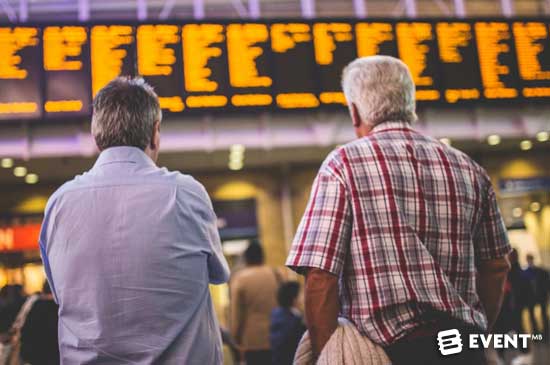Skift Take
It’s all in the question. Event planners ask attendees a lot of questions but those posed are not always as they seem. Find out the hidden meanings behind the smart questions we ask our attendees.
It’s illegal in a job interview to ask someone if they have children. Yet once I was asked to name each of the Teletubbies. I failed that question but it probably revealed to the interviewer I didn’t have kids.
Event pros use trick questions on attendees as well, although probably not as borderline questionable as that scenario. Still, sometimes there are things that are just too awkward to approach in a straightforward manner and so we ask a trick question to get the info we need. Here are some of the most common hidden meaning questions that event planners ask of attendees and their translations.
While you’ll talk to attendees throughout your event, the most common touch points are during registration and post-event/session surveys. We’ve divided these hidden meaning questions into those two areas.
##abovethefold##
Smart Registration Questions for Attendees
Obviously there is some basic information you need to attract from attendees during the event registration process, however there are some trick questions you can ask which can reveal a whole lot more.
-
What Are You Expecting from this Event?
This little question can give you some big insights into pleasing your attendees. If you have a large number of early-bird registrants who answer it, you may even be able to use the information to alter your offerings early enough to be more in line with their answers. Even late answers could be valuable when planning the next event. However, event planners have another reason for asking this….
Event Planner Meaning:
When event planners ask this question they are actually wanting their attendees to give some thought as to what they actually want to get out of attending. If they know ahead of time, they’ll have a much more successful event.
This is one of those questions that places a thought in the attendee’s mind. “What do I want? Let me think about this.” By asking this question early, event planners are setting themselves up for success because they’re inserting the value question at a time when it can still influence the experience.
2. Is This Your First Time Attending?
Being able to assess answers and segment newbie attendees and event veterans is useful and can allow you to ask additional questions on the registration form to those attending for the first time. You might want to send some personalized pre-event communications according to whether they have past guest or first-timer status to make each and every guest feel valued.
Event Planner Meaning:
“People are most excited about an event their first time out. They’re more apt to talk about it and share it with their friends and people on social media. I need to make a good impression on all newbies and also might want to offer extra welcome sessions and support to make sure these new attendees become loyal attendees.”
3. When Are You Arriving?
This is a question that the attendee may not know when they first register, but it is valuable to collect from them before they appear. A good way of asking is part of an event drip campaign prior to check-in. About two-weeks prior to the event, the attendee should have solidified their travel arrangements so send them an email telling them how excited you are they’ll be joining you. As part of that email redirect them back to their event profile and ask them to fill you in on their travel arrangements.
Even if you don’t offer a shuttle from the airport, unless it is a local event you may want to ask this question anyway.
Event Planner Meaning:
“I want to know how many people to have waiting at registration to make the process go as smoothly as possible without having staff waiting around with nothing to do. Gauging when people come in isn’t about hospitality as much as it is manpower. Plus it tells me that if lots of attendees are coming in early, it might be a nice suggestion to vendors to host pre-event gatherings. I’m always trying to find opportunities for my vendors to connect with my attendees.”
4. Please List Your Emergency Contact Information.
Emergency contact information used to be a rarely requested or used piece of info. It spoke to people with known medical needs but most weren’t all that concerned about it, especially since we all carry cell phones and contacts can often be plucked from there.
Event Planner Meaning:
With today’s concerns over unexpected violence and security, these critical pieces of information can give us all peace of mind and ensure notifications are made quickly.
5. Are You on Social Media? If so, where? Handles, please.
There doesn’t seem to be much hidden about this question. If answered, an event planner knows where you are on social. It helps remind attendees that you see a value in social media and that you look to connect with them.
Event Planner Meaning:
“I will have an intern follow every person on every platform listed in this registration section. I will create a list on Twitter for easy scanning of shared content. And I will share attendees’ content before, during, and after the event in order to establish better connections. By sharing their content, I hope they’ll share mine too.”
6. What Track Are You Interested In?
At first glance, this question appears to be all about traffic flow and allocating resources, but there is more to it than that. At the point that it’s asked, the agenda has likely been solidified so it’s no longer about how many speakers or sessions will be offered in a particular track. However, it helps gauge variables between tracks as well as space.
Event Planner Meaning:
“I need to know approximately how many people will be in each track so that I can decide which sessions need the largest rooms. While I won’t hold you to this as if it were set in stone, people change their minds and are sometimes swayed by friends. I sure wish I could hold you to it though because you would be less likely to get shut out of a session due to space!”
7. Shirt Size
It’s not about being nosey or wondering how large your attendees are, okay maybe a very little bit of it is. Mainly the size question is all about the giveaway t-shirt.
Event Planner Meaning:
“I really hate getting stuck with tons of t-shirts on either end of the size spectrum and not enough in the middle. People get really angry when all you have is something much smaller than they are.”
Smart Post-event Survey Questions
After the event is over there is valuable information attendees can share if you know the right questions to ask.
8. Rate the Speakers
At first glance, this question is all about attendee satisfaction as that’s gold for any event planner. However, there’s something deeper at work here. In the case of an outdated speaker or one that isn’t a good fit but has connections to the event, the planner could simply be asking the audience to provide a reason for them not to invite the speaker back next year. This gets them out of what could be a very touchy situation if the speaker is a valued sponsor or one with other types of connections to the event.
Event Planner Meaning:
“Give me a reason to can this turkey.”
On the other side, it could mean:
“Give this person high marks because I was really excited to have them speak in front of you but the board or the client, or some other entity, had their doubts. Go ahead. Prove them wrong.”
9. What Did You Think of the Food and How Could We Improve?
This question is another one aimed at attendee experience but it can also be a cost-cutting one. If you splurged on some type of food that wasn’t appreciated, you can nix it from next year’s menu. One the other hand, if you went against suggestions and splurged on “farm-to-table” it’s nice to prove how well you know the attendee and their preferences. It is also valuable feedback for the venue and catering team and might make or break whether you work with this venue again next year or expect some negotiation on the venue rates.
Event Planner Meaning:
“I won’t be spending that next year”
or
“I was right! I knew you would love it. Take that client.”
10. What Did You Like Most About the Event?
This is a pretty common question to assess areas to continue as is. Innovation is essential but if you know that your audience really enjoyed something, you can consider it sacred and repeat your performance next year, focusing on different areas to improve. However, there is another side to the question.
Event Planner Meaning:
“Name one thing that stood out to you – and it better be something significant that I can replicate.”
11. What Did You Like Least About the Event?
You can’t ask the previous question without asking its ugly step sibling. The one problem with this question is that it requires attendees to dwell on the negative. Still, you can’t have one without the other so if you want to ask #9, you need #10 as well. This can be used to make changes for next year.
Event Planner Meaning:
“If you tell me something ridiculous that is out of my control like the airlines losing your luggage, I will ignore all your other answers on this survey.”
12. Was the Exhibitor Hall Worthwhile?
If your event didn’t have an exhibitor hall you still probably asked a question about vendors meeting the attendees’ expectations. After all, it’s important to have the types of vendors and sponsors that the attendees are interested in.
Event Planner Meaning:
“These people are willing to pay us a decent amount to attend our event. I really don’t want to hear anything bad about them unless you have someone lined up right behind them to take their place.”
13. How Can We Improve This Event?
“If I had asked the people what they wanted, they would’ve said faster horses,” is a quote commonly attributed to Henry Ford. Whether he said that in context or not isn’t as relevant as the fact that often attendees don’t know what they want until you show it to them or somebody else does. For your sake, you can only hope it’s you and not someone else who does.
Event Planner Meaning:
“I’m just going to skip over reading this question because I have yet to see someone answer about doing something we haven’t already done, they just aren’t aware of it. Still, a person can dream that one day we’ll get some real innovative genius in this answer.”
14. How Likely Are You to Recommend This Event to a Friend/Colleague?
It’s the million dollar question and one that’s a lot more telling than other “rate the event” type questions. Here’s why. Some people don’t give perfect scores. Even if they had a wonderful time, they assume there’s always room for improvement. (I should know. I’m one of them.) So you get an 8 or 9 when they have nothing negative to say. They simply believe no one is perfect and your assessment pays the price for that. I refer to that as the perfection bias.
However, if you ask a question about recommendations to friends and colleagues, you’re taking the perfection bias out of it. Now, they either will or won’t recommend you.
Event Planner Meaning:
“I really need you to give us some love on social media. Maybe reminding you of your ability to recommend us will persuade you to do so.”
15. How Likely Are You to Attend a Future Event of This Type?
This question is usually asked on an interval scale that includes wording something along the lines of very likely, it’s possible, not sure, doubtful, and no way. It’s another way of navigating that perfection bias because while the attendee may not give a perfect ten, they will tell you if they’re pleased enough to attend again and that’s what’s really important.
Event Planner Meaning:
This is an early way to gauge retention and chart whether attendees viewed the event as valuable. But really it’s a good statistic to show the client so the event planner can say, “See, we did a good job.”
In Conclusion
This article is partly tongue-and-cheek but by calling out some of the most popular questions event planners ask attendees and why they do so, you may decide there are things you need to ask that you haven’t.
Communication is essential to the success of events and you certainly want your attendees to feel part of the event conversation. Most successful event planners ensure that attendees have a say in some of what they’re offering. However, not every question can be taken at face value. Sometimes the event planner has a much deeper meaning in the question asked, in order to try to extract extra information that would be valuable to them. And for those situations, it’s helpful to have this translator to inspire you.
What smart questions do you ask your attendees and why?
Additional Reading on Attendee Feedback
15 Ideas to Collect Feedback at Events
Face Recognition – the End of Event Feedback Forms?
5 Interactive Ways to Get Real-Time Event Feedback
16 Inevitable Ways to Make Event Attendees Happy









